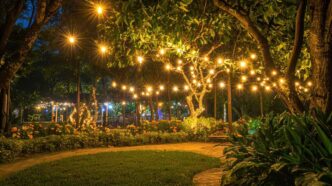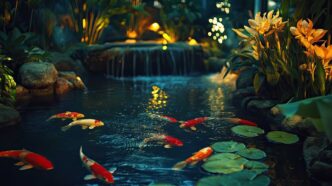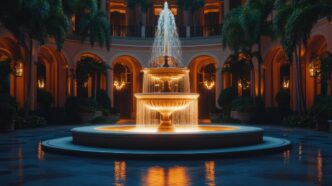Table of Contents: LED Wall Art Lighting
- Strip Lights for Backlight Drama and Depth
- Use String Lights to Integrate Lighting with the Art Itself
- Implement Uplighting and Downlighting Techniques
- Create Shadow Play with Cutouts and Grilles
- Mingle Accent Lighting with Vertical Gardens
- More Tips for Successfully Lighting Wall Art
- Make a Statement with Illuminated Outdoor Wall Art
- FAQs for Lighting Wall Art
Outdoor wall art has always been a stylish way to add personality and texture to your landscape. During the day, the sun makes your favorite pieces shine—but why let the sun have all the fun? With the right lighting setup, you can turn your backyard walls into illuminated focal points that glow long after dark.
Whether you’re spotlighting metal sculptures, backlighting a mural, or adding ambiance to a vertical garden, here are some creative ways to install illuminated outdoor wall art that blends style with function.
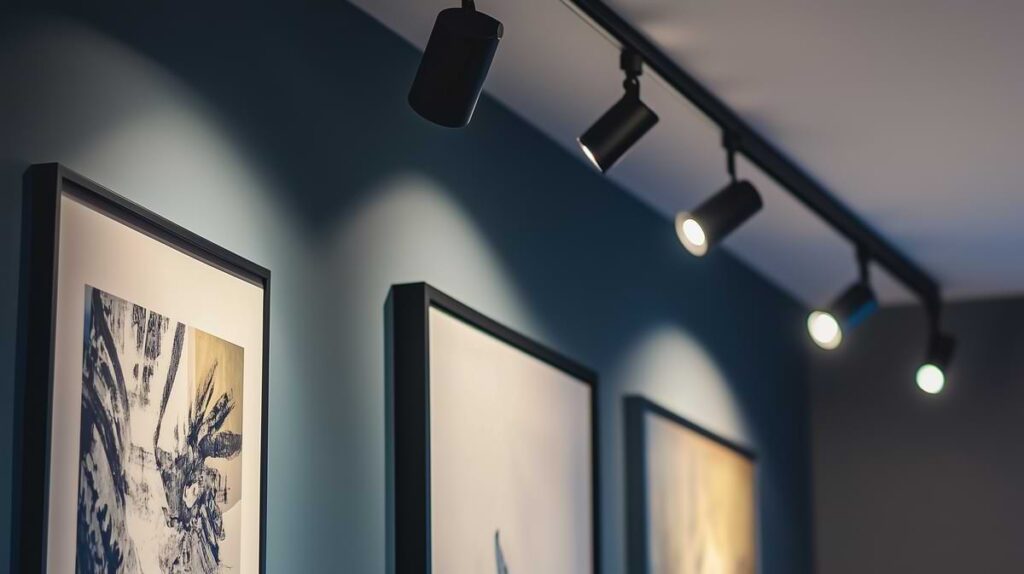
Strip Lights for Backlight Drama and Depth
One of the most striking ways to light outdoor wall art is from behind. Backlighting works especially well with metal cutout designs or slatted installations that have negative space.
Mount your LED strip lights behind the artwork for a halo effect, or use weatherproof puck lights to cast a gentle glow. This method not only highlights the shape of the piece but also creates depth, making your wall art appear to float off the surface.
Use String Lights to Integrate Lighting with the Art Itself
Some of the most eye-catching displays come from combining lighting and artwork into a single installation. Try using Edison bulbs as part of an industrial-inspired sculpture, or route your waterproof, professional-grade LED string lighting through the frame of an abstract metal design.
Solar-powered designs with embedded LEDs are a low-maintenance option that works well on garden walls and fences.
Implement Uplighting and Downlighting Techniques
For a gallery-like effect, consider mounting spotlights above or below your outdoor wall art. Uplighting from the ground can cast dramatic shadows, especially on textured or three-dimensional pieces such as carved wood panels or relief sculptures.
Downlighting—mounted under eaves or pergola beams—adds a subtle wash of light that highlights the piece without overwhelming the space. Make sure to use fixtures with adjustable beams to fine-tune the angle.
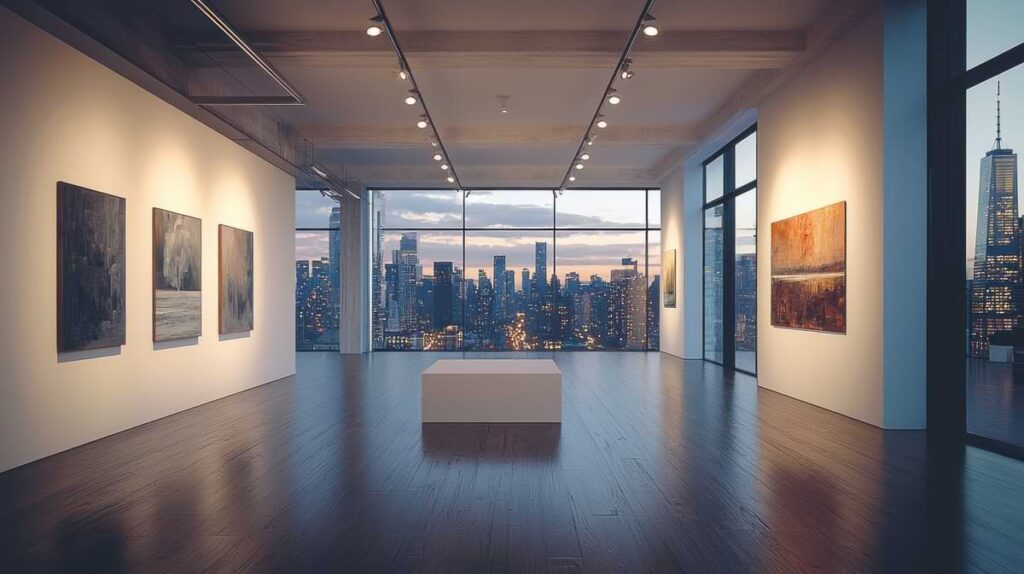
Create Shadow Play with Cutouts and Grilles
If your wall art includes intricate patterns, such as a laser-cut screen or decorative grille, use dynamic lighting to turn those patterns into moving shadows.
Position the light source to project patterns onto adjacent surfaces such as patios, decks, or walkways. This technique brings a layer of interactive design into your space and works well in modern, minimalist landscapes.
Mingle Accent Lighting with Vertical Gardens
Living walls and vertical gardens count as wall art, too, especially when you illuminate them in a creative way. Use waterproof spotlights or flexible LED strip lights to add depth, highlight specific plants, and emphasize the natural color contrast of your garden.
For a whimsical touch, you can intersperse professional-grade string lights throughout the foliage or backlight trellises to create a layered glow.
More Tips for Successfully Lighting Wall Art
Creative lighting doesn’t stop with the installation: small details make a big difference in both aesthetics and longevity. Keep these key tips in mind to get the most out of your illuminated wall art.
- Weatherproof Everything: Always choose outdoor-rated, waterproof fixtures with the correct voltage for your transformer setup.
- Mind Your Angles: Consider the direction of natural light and nearby structures to avoid glare or light pollution.
- Keep It Clean: For long-term success, mount all fixtures securely and conceal wires with conduit or behind trim for a clean look.
Make a Statement with Illuminated Outdoor Wall Art
Illuminating your outdoor wall art is more than just a lighting project; it’s a creative expression that transforms your space after dark. Illuminated wall art doesn’t just elevate your outdoor space—it creates ambiance, draws the eye, and extends the personality of your home into the night.
By thoughtfully combining form and function, you can highlight the textures, colors, and contours that make your landscape unique. Whether you’re going bold with backlighting or keeping it subtle with accent spots, the right lighting can turn any blank wall into a nighttime masterpiece.
FAQs for Lighting Wall Art
You can illuminate wall art using backlighting, spotlights, or integrated LED strips. Position lights to highlight the shape, texture, or color of the piece without creating harsh glare. Use outdoor-rated, low-voltage fixtures for safety and durability.
Wall lighting is commonly referred to as sconces, uplights, or wall washers. In landscape lighting, these fixtures are designed to highlight surfaces and architectural features. Each type offers a different beam angle and effect.
Avoid placing lights too close or at sharp angles to prevent heat damage and glare. Use soft, even lighting to preserve color accuracy and detail. In outdoor settings, always use waterproof, UV-resistant fixtures for longevity.
Join our Insider list and check out the different lighting options that we have to offer.




